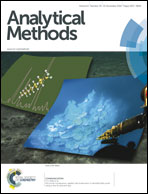Poly-γ-glutamic acid modified magnetic nanoparticles for fast solid phase extraction of trace amounts of Cu(ii) and Pb(ii)
Abstract
In the present study, poly-γ-glutamic acid (γ-PGA) was applied to functionalize the silica-coated magnetic nanoparticles for solid-phase extraction of Cu(II) and Pb(II). Firstly, the silica-coated magnetic nanoparticles were modified with γ-PGA using the sol–gel method. Fourier transform infrared (FT-IR) spectrum analysis confirmed that γ-PGA was bound onto the magnetic nanoparticles, and the Transmission electron microscope (TEM) image showed that as-prepared nanoparticles were of typical core–shell structure with an average size of 12.5 nm. Secondly, the γ-PGA modified magnetic nanoparticles were used in solid-phase extraction of Cu(II) and Pb(II). Various parameters including the pH, eluent concentration, eluent volume, extraction time, and sample volume, and potentially interfering ions were investigated to establish the optimal experimental conditions. Under the optimal conditions, the limits of detection (LOD) for Cu(II) and Pb(II) were 0.46 and 1.43 μg L−1 respectively, and the enrichment factors reached 166 and 133, as well as the low relative standard deviations (RSDs, n = 7, c = 50 μg L−1) of 2.48% and 7.42% for Cu(II) and Pb(II), respectively. Moreover, the as-synthesized sorbent was efficient for extraction of Cu(II) and Pb(II) from different practical water samples. This study provided a fast, simple and selective heavy metal analysis method using solid phase extraction coupled with flame atomic absorption spectrometry.


 Please wait while we load your content...
Please wait while we load your content...